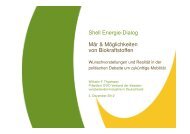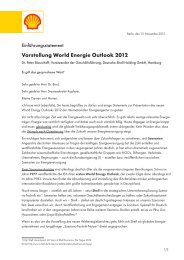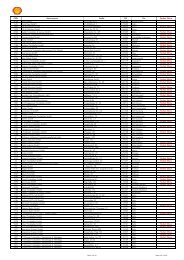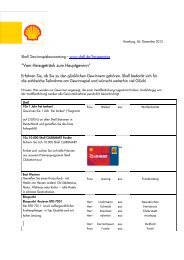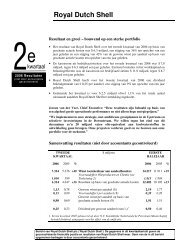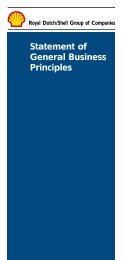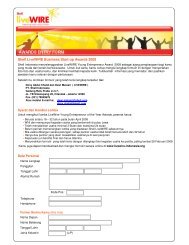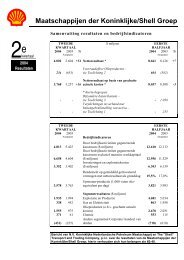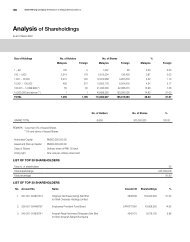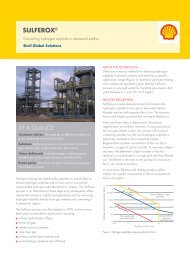62414 sustain 40pp (Mag)
62414 sustain 40pp (Mag)
62414 sustain 40pp (Mag)
Create successful ePaper yourself
Turn your PDF publications into a flip-book with our unique Google optimized e-Paper software.
Sustainable development is part of the duties<br />
of every manager. Support is provided by HSE,<br />
social performance, security, human resources<br />
and finance specialists. Each of our businesses<br />
is responsible for complying with our<br />
requirements and achieving its specific targets<br />
in this area.<br />
Strengthening controls and<br />
aligning incentives<br />
We monitor compliance through an annual<br />
assurance letter process. It requires the relevant<br />
senior manager to report to the Chief Executive<br />
on the performance of his or her business or<br />
function in following our Business Principles<br />
and Group Standards. Results are reported to<br />
the Audit Committee of the Board.<br />
We also regularly audit our facilities’ HSE<br />
management systems. All our major plants are<br />
required to be externally certified to<br />
international environmental standards, for<br />
example ISO 14001. Our Code of Conduct<br />
provides detailed guidance on the behaviour<br />
required from our staff by our Business<br />
Principles (page 21).<br />
In addition, external panels and observers help<br />
us monitor environmental and social<br />
performance. For example, a panel of scientific<br />
experts reviews compliance with our animal<br />
testing standard.<br />
Community panels at a number of downstream<br />
facilities track and advise us on our social<br />
performance (pages 26–27). Independent<br />
experts are monitoring Sakhalin Energy’s<br />
pipeline construction and the joint venture’s<br />
efforts to avoid harm to the western gray<br />
whales (pages 34–35).<br />
Sustainable development also contributes to<br />
performance appraisals and pay. In 2006,<br />
it again accounted for 20% of the companywide<br />
scorecard.<br />
Additional web content:<br />
• More on our company-wide environmental and social<br />
commitments and standards.<br />
• How we do environmental, social and health<br />
impact assessments.<br />
• More on our corporate governance (including terms of<br />
reference for our Social Responsibility Committee).<br />
www.shell.com/makingithappen<br />
The Social Responsibility Committee<br />
Building skills and sharing best<br />
practice in Project Academy.<br />
The Royal Dutch Shell plc Board has four committees. The Social Responsibility Committee is<br />
one. It reviews and advises on our policies and performance with respect to our Business<br />
Principles, Code of Conduct, HSE policy and other relevant environmental and social standards<br />
and major issues of public concern. It is composed of three Non-executive Directors, including its<br />
Chairman, Wim Kok, former Prime Minister of the Netherlands.<br />
The Committee takes an active role in assessing and advising on our activities in this area on<br />
behalf of the Board. It meets four times a year, receiving reports and interviewing management on<br />
our overall HSE and social performance, and on our management of environmental and social<br />
impacts at major projects and operations. It provides input on and reviews drafts of this Report,<br />
including meeting face to face with our External Review Committee. The Social Responsibility<br />
Committee also travels to Shell locations, meeting with local staff and external stakeholders to<br />
understand first hand the site’s operational performance, what relationships are like with the local<br />
community and how our standards are being implemented in practice. In 2006, it went to our<br />
natural gas projects in Corrib, Ireland and Pinedale, Wyoming, and the Motiva joint venture<br />
refinery in Port Arthur, Texas. It was also in New Orleans, Louisiana to see how the recovery of the<br />
city was progressing after the 2005 hurricanes and understand Shell’s contribution. In early 2007,<br />
the Committee went to our operation on Sakhalin Island and Wim Kok went to Nigeria with the<br />
Chairman of the Board. After each visit, the Committee shares its observations with the Board,<br />
including the Executive Director responsible for that project or site.<br />
“ As a committee we are serious about getting a first-hand understanding of the<br />
company’s environmental and social performance, including relationships with local<br />
communities. Our site visits are crucial for this, letting us talk directly to local Shell<br />
staff and their external stakeholders.<br />
”<br />
Wim Kok<br />
Maarten van den Bergh Wim Kok Nina Henderson<br />
THE SHELL SUSTAINABILITY REPORT 2006 31


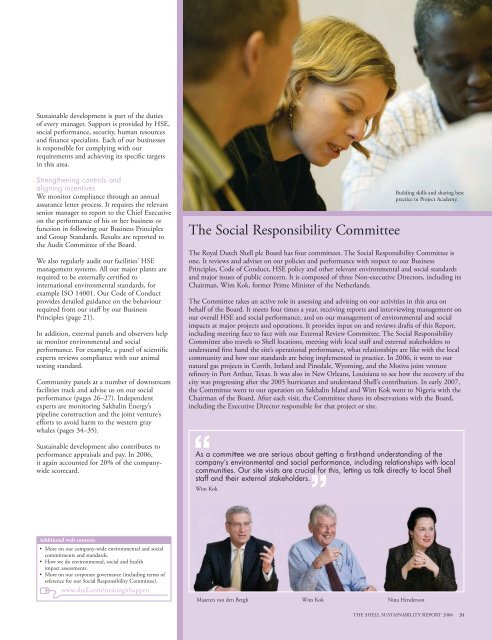
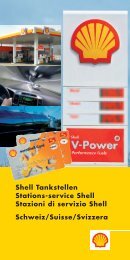
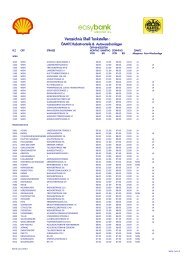
![Download Shell AutoGas Stationen [Stand: Januar 2013] (PDF](https://img.yumpu.com/9982753/1/190x245/download-shell-autogas-stationen-stand-januar-2013-pdf.jpg?quality=85)
